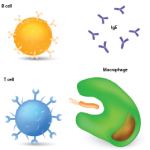B cells may participate in immune dysregulation at multiple levels by presenting antigens and providing costimulatory signals to T cells and helping to regulate and organize inflammatory responses through cytokine and chemokine secretion (such as interleukin-10, interleukin-6, interferon-γ, and lymphotoxin-a [LTa]).2–4 A particularly important function of B cells may be the direct effect they have on lymphoid neogenesis through the production of LTa. The formation of tertiary or ectopic lymphoid tissue is a process that may lead to dysregulated B/T-cell interactions and local amplification of autoimmune responses in multiple autoimmune diseases, including RA, Sjögren’s syndrome, type I diabetes, MS, inflammatory bowel disease, Hashimoto’s thyroiditis, and SLE.5
For diseases or subsets of disease where autoantibodies play a more central pathogenic role (e.g., autoimmune hemolytic anemia in SLE or neuromyelitis optica), it is likely important to truce the production autoantibodies with therapy. For B cell–depletion therapy with anti-CD20, this reduction may occur indirectly if the autoreactive plasma cells are short lived and precursor B cells are efficiently depleted. Targeting long-lived plasma cells is more challenging, because these cells appear to be resistant to most therapies, including anti-CD20.
B Cell-Targeted Therapy in RA and SLE
A number of different approaches to targeting B cells have been utilized: 1) B-cell depletion with monoclonal antibodies against B cell–specific molecules (e.g., anti-CD20); 2) induction of negative signaling in B cells (e.g., anti-CD22); and 3) blocking B-cell survival and activation factors (e.g., anti-BAFF). (See Table 2, p. 26.)
TABLE 1: The Expanding Spectrum of Diseases Treated with B Cell–Depletion Therapy
FDA approved
- RA (anti-TNF failures)
Randomized controlled trials completed
- SLE general
- SLE nephritis
- Relapsing-remitting MS
- Primary progressive MS
- Antineutrophil cytoplasmic antibody (ANCA)–mediated vasculitis
- Type 1 diabetes
Others
- Neuromyelitis optica
- Sjögren’s
- Scleroderma
- Myositis
- Antiphospholipid syndrome
- Idiopathic thrombocytopenic purpura (ITP)
- Thrombotic thrombocytopenic purpura (TTP)
- Transplant rejection
- Inflammatory bowel disease
- Chronic graft-versus-host disease
- Blistering skin diseases
- Idiopathic membranous nephropathy
- Pulmonary hypertension
- Hepatitis C cryoglobulinemia
- IgM-associated polyneuropathy
- Uveitis
- Autoimmune paraneoplastic syndromes
B Cell–Depletion Therapy
Since CD20 is expressed on immature, naive and memory B cells but not mature plasma cells, in the use of rituximab (anti-CD20) in patients with lymphoma and RA, B cells are depleted, but serum IgG does not change significantly. The success of several large phase II–III trials of rituximab in RA led to its approval for tumor necrosis factor (TNF) refractory disease in 2006. As rheumatologists have become more familiar with using this therapy in RA, there has been expanding off-label use in other rheumatic diseases, including SLE and antineutrophil cytoplasmic antibody vasculitis.
Despite considerable enthusiasm for rituximab in SLE, two recent placebo-controlled trials in nonrenal lupus (EXPLORER) and renal lupus (LUNAR) failed to meet primary endpoints. Although EXPLORER is clearly the best trial we have so far on the use of rituximab for SLE, it does have problems. It was designed to enter patients who had very active disease and therefore were treated aggressively with moderate- to high-dose glucocorticoids. This approach makes the detection of a benefit difficult over the short term. Interestingly, the rituximab-treated group did have a serological response by the one-year endpoint, suggesting that some clinical benefit might have accrued with longer follow-up.
